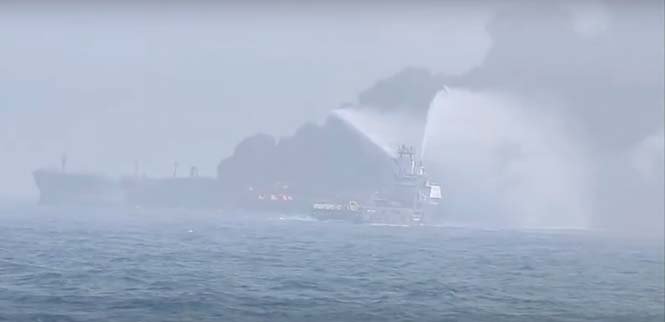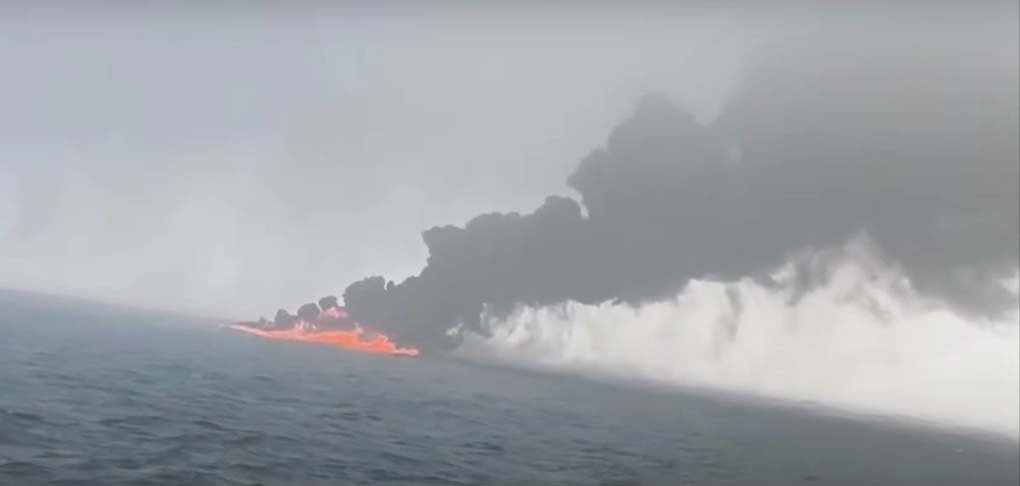ROTTERDAM, Netherlands — The North Sea, one of the world’s busiest shipping lanes, became the scene of a nautical nightmare early Tuesday when a fully filled oil tanker and a huge container ship collided near the Dogger Bank fishing areas. The collapse, which occurred in dense fog, has generated a large emergency response, aroused worries over a potential ecological calamity, and left the worldwide shipping sector bracing for ripple repercussions.
As rescue helicopters flew overhead and oil-slick containment booms snaked across the sea, the scale of the situation began to materialize. The Liberian-flagged oil tanker Atlantic Dawn, carrying 120,000 metric tons of crude oil, struck the Singapore-registered cargo vessel MV Horizon around 4:15 a.m. local time. Both ships experienced substantial damage, with the Atlantic Dawn’s hull breached near her cargo holds. By midday, satellite imagery reviewed by MarineTraffic showed a growing oil slick spanning approximately 3 square kilometers.
Collision in the Fog: A Chain of Errors?
Initial reports from Dutch and British coast guards show poor visibility owing to high fog played a crucial role. “Ships in the area had been warned about reduced visibility, but this collision underscores how quickly conditions can turn lethal,” said Lars Nielsen, a spokesperson for Denmark’s Maritime Authority, in a statement to Reuters.
The Atlantic Dawn’s crew reported a sudden loss of steering minutes before impact, according to leaked audio from the ship’s bridge obtained by BBC News. The container ship MV Horizon, en route from Hamburg to Singapore, attempted evasive maneuvers but was unable to avoid the collision. “It was like watching two skyscrapers crash into each other in slow motion,” said Jakob Hertz, a crew member aboard a nearby Danish cargo ship who witnessed the incident.
Rescue Efforts and Environmental Peril
All 42 crew members from both vessels were evacuated by helicopter, with three hospitalized for burns and smoke inhalation. But the human toll is only part of the story. The Atlantic Dawn’s ruptured hull has leaked an estimated 2,500 tons of crude oil into the North Sea, according to the European Maritime Safety Agency (EMSA), threatening one of Europe’s most fertile fishing grounds.
“This is an ecological time bomb,” warned Dr. Ingrid Visser, a marine biologist with the North Sea Conservation Trust, in an interview with The Guardian. “The Dogger Bank is a nursery for cod, plaice, and sand eels. An oil spill here could devastate fish stocks for a generation.”
Dutch and German environmental agencies have deployed dispersants and skimming vessels, but rough seas and shifting winds are hampering cleanup efforts. Greenpeace’s Rainbow Warrior has also joined the operation, with activists criticizing the slow response. “We’re racing against time to prevent this spill from reaching the Wadden Sea,” said Greenpeace campaigner Anika Müller, referencing the UNESCO-protected wetlands nearby.

Shipping Chaos: Economic Shockwaves
The collision has forced the closure of a critical segment of the North Sea shipping lane, stranding over 200 vessels and snarling supply chains. The Rotterdam Port Authority, Europe’s largest shipping hub, announced delays of up to 72 hours for incoming cargo. “This couldn’t have happened at a worse time,” said port director Erik van der Burg, speaking to Bloomberg. “Global shipping is still recovering from the Suez Canal blockage. Now, we’re staring down another logistics crisis.”
Insurance analysts predict claims could exceed $500 million, factoring in cargo losses, environmental damage, and legal liabilities. “This incident will renew debates about who’s responsible when autonomous navigation systems fail,” said maritime lawyer Clara Fernández, referencing the MV Horizon’s use of semi-automated piloting technology, as reported by Lloyd’s List.
Human Stories: Fear and Resilience
Behind the headlines are stories of survival and community anxiety. In the Dutch fishing village of Scheveningen, locals fear the spill could erase their livelihoods. “My family has fished these waters for 100 years,” said Willem De Jong, 58, his voice cracking. “If the oil reaches the coast, it’s over for us.”
Meanwhile, evacuated crew members grappled with trauma. “I heard metal screaming, then the smell of burning oil,” recalled Atlantic Dawn engineer Rajiv Kapoor, 34, from a hospital bed in Rotterdam. “We’re lucky to be alive, but I keep seeing the fire.”
Regulatory Reckoning: Calls for Stricter Rules
The collision has intensified scrutiny of maritime safety protocols. While the International Maritime Organization (IMO) mandates collision-avoidance systems, critics argue enforcement is lax. “Many ships still rely on outdated radar systems,” said Capt. Sarah Lindholm, a Swedish naval safety expert, in an interview with Al Jazeera. “Human error and tech failures are a deadly mix.”
The IMO has convened an emergency session to discuss stricter fog-navigation rules and faster phase-outs of single-hull tankers, which are more prone to leaks. But reforms face pushback from shipping giants. “The industry prioritizes profit over safety,” alleged German environmental minister Svenja Schulze during a press conference covered by DW News.
What’s Next?
As salvage crews work to stabilize the Atlantic Dawn and prevent further leaks, the incident serves as a grim reminder of the North Sea’s fragility. Environmental groups are demanding permanent traffic reductions in high-risk zones, while tech firms pitch AI-driven navigation as a solution. For now, the region holds its breath. “The sea gives us life,” said fisherman De Jong, staring at the horizon. “But today, it feels like it’s turning against us.”
Related Video:
Sources:
- MarineTraffic: Satellite data on oil slick expansion.
- Reuters: Statements from Danish Maritime Authority.
- BBC News: Audio leaks from the Atlantic Dawn bridge.
- European Maritime Safety Agency (EMSA): Oil spill volume estimates.
- The Guardian: Marine biologist commentary on ecological risks.
- Bloomberg: Rotterdam Port delays and economic analysis.
- Lloyd’s List: Insights on autonomous navigation systems.
- Al Jazeera: Expert analysis of maritime safety failures.
- DW News: German minister’s critique of shipping industry.
- Greenpeace: Cleanup challenges and activist responses.
Explore More:
- Tragic Midair Collision Close to Washington, D.C.: No Survivors Anticipated
- Devastating Arizona Midair Crash: 2 Lives Lost at Marana Airport

